




To me Christmas without Bach is unthinkable. No other musician before or since has captured the wondrous essence of the Nativity, the miracle of the Virgin birth, and the coming of God’s light into the world coinciding with the turning of the sun at the winter solstice.
The six interlinked cantatas which make up Bach’s Christmas Oratorio are a mesmerising blend of reflection and celebration. He explores a stupendous range of vocal and instrumental timbres – from the irresistible élan of his festive trumpets and drums, to the haunting pastoral hues for the arrival of the shepherds at the stable, and the glittery sheen of the majestic horns who accompany the magi to Bethlehem.
Part of an international tour: Teatro alla Scala, Milan Saturday 3 December, 8.00pm
Chapelle Royale, Château de Versailles, Versailles Sunday 11 December, 2.00pm
St Martin-in-the-Fields, London Tuesday 13 December, 7.30pm
St Martin-in-the-Fields, London Thursday 15 December, 7.30pm
 Image: Epiphany by Darko Topalski
Image: Epiphany by Darko Topalski
Nick Pritchard tenor | Evangelist
Hilary Cronin soprano
Alison Ponsford-Hill soprano
Hugh Cutting countertenor
Jonathan Hanley tenor Frederick Long bass
Christopher Webb bass
Dingle Yandell bass
Tuesday 13 December 7:30pm
Johann Sebastian Bach (1685-1750)
Weihnachtsoratorium / Christmas Oratorio
Part 1: Am ersten Weihnachtsfeiertage / For the First Day of Christmas
Part 2: Am zweiten Weihnachtsfeiertage / For the Second Day of Christmas
Part 3: Am dritten Weihnachtsfeiertage / For the Third Day of Christmas
Johann Sebastian Bach (1685-1750)
Weihnachtsoratorium / Christmas Oratorio
Part 4: Am Feste der Beschneidung Christi / For the Feast of the Circumcision
Part 5: Am Sonntage nach Neujahr / For the First Sunday in the New Year
Part 6: Am Fest der Erscheinung Christi / For the Feast of Epiphany
Livestreamed from St Martin-in-the-Fields, London, on STAGE+ by Deutsche Grammophon. Produced by Stagecast. All information in this brochure was correct at the time of going to print.
The age of Bach and Handel did not subscribe to our notions of artistic ‘originality’. Composers would cheerfully adapt their own and other musicians’ works for different forces if the occasion demanded, often rewriting extensively in the process. Nor, despite the nineteenth century’s protestations to the contrary, was there a clear stylistic divide between the sacred and the secular. Several numbers in Messiah, for instance, draw on Italian duets with amorous texts, yet fit seamlessly into Handel’s scheme. In the same way, several of Bach’s sacred cantatas recycle without incongruity movements originally composed to secular texts. Even if they had known the originals, Bach’s Leipzig congregation would hardly have batted an eyelid at the Thomaskantor’s musical economy.
This blurring of sacred and secular was, though, a source of embarrassment to many 19th and early 20th-century Bach scholars, who tended to equate religious significance with aesthetic worth. Most embarrassing of all was the Christmas Oratorio, which draws on three secular cantatas in no fewer than 12 of its movements. Scholars turned intellectual somersaults to try and explain and justify the borrowings, or ‘parodies’. Some dismissed the oratorio as inferior Bach. Others sought to prove that it, in fact, preceded the offending cantatas. In the 1950s the editors of the Urtext edition even put forward the bogus argument that, while Bach did indeed compose the secular settings first, he had planned to use the music in the Christmas Oratorio all along!
The secular cantatas in question were all drammi per musica, celebratory works written in 1733 and 1734 for the Dresden royal family, with whom Bach was assiduously cultivating ties. ‘Lasst uns sorgen’, BWV 213
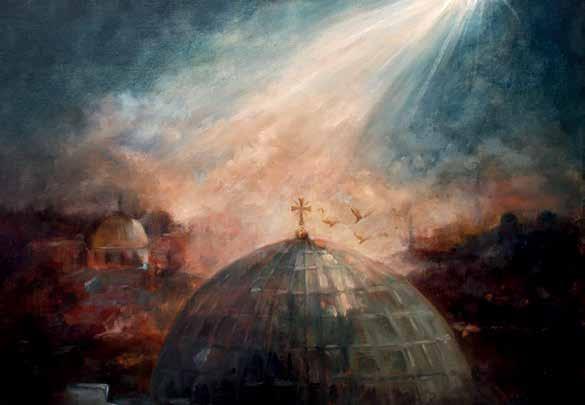 Image: Epiphany by Darko Topalski
Image: Epiphany by Darko Topalski
(subtitled ‘Herkules auf dem Scheidewege’ –Hercules at the Crossroads), was composed for Crown Prince Friedrich of Saxony’s eleventh birthday, ‘Tönet ihr Pauken’, BWV 214, for the birthday of Maria Josepha, Electress of Saxony and Queen of Poland, and ‘Preise dein Glücke’, BWV 215, for the anniversary of the coronation of the Saxon Elector, Friedrich August II, as King of Poland. Towards the end of 1734, Bach began work on an ‘oratorium’ (his designation) comprising six cantatas for performance in the two main Lepizig churches, St Thomas and St Nicholas, between Christmas Day and Epiphany 1734-35. As a supremely practical musician working against the clock, he was only too happy to reuse some excellent ‘occasional’ music that would otherwise have gathered dust.
Bach lifted the opening choruses and all but one of the arias in the first four cantatas virtually unaltered from the Dresden celebratory cantatas. Newly composed were the recitatives, ariosos and chorale settings, the so-called turba choruses (eg ‘Ehre sei Gott’ in Part Two), and the ‘Pastoral Symphony’. Nineteenth-century purists had fewer problems with the fifth and sixth cantatas. The only borrowings in Part Five are the bass aria ‘Erleucht auch meine finstre Sinnen’ (from BWV 215), and the brief turba chorus ‘Wo ist der neugeborene König?’ (No.45), which almost certainly started life in Bach’s lost St Mark Passion. Fragmentary evidence also suggests that most of the numbers in Part Six use music from a lost church cantata.
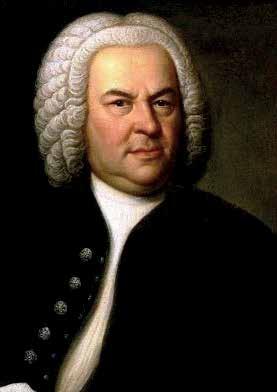
In one case the borrowing seems slightly misjudged: the echo effects in the soprano’s lilting aria ‘Flösst mein Heiland’ in Part Four, prompted in BWV 213 by Hercules’s aria ‘Treues Echo’, are charming enough, but sound rather arbitrary in their new context. With this sole exception, the recycled pieces are ideally chosen, their melodic freshness and exuberant or graceful dance rhythms meshing perfectly with the joyous subject matter.
Although Bach designed the oratorio’s six parts as self-contained cantatas, each to be sung at a different service over the 12 days of Christmas, he certainly conceived them as a single cohesive entity. One linking thread is the Gospel narrative of the Evangelist (traditionally sung by a tenor), taken from St Luke 2 (the first four cantatas), and St Matthew 2 (cantatas five and six). The remaining texts, for the arias, choruses and chorales, were probably by the Leipzig poet Christian Friedrich Henrici, who wrote under the pseudonym ‘Picander’. Musically, Bach unifies the oratorio by the
Johann Sebastian Bach‘ALTHOUGH BACH DESIGNED THE ORATORIO’S SIX PARTS AS SELF-CONTAINED CANTATAS, EACH TO BE SUNG AT A DIFFERENT SERVICE OVER THE 12 DAYS OF CHRISTMAS, HE CERTAINLY CONCEIVED THEM AS A SINGLE COHESIVE ENTITY.’
use of the ‘Passion’ chorale, ‘Herzlich tut mich verlangen’ (so-called because of the melody’s fivefold appearance in the St Matthew Passion), in both the first and last cantatas, and by a cohesive key structure centred on D major, with its associated festive trumpets and drums.
Part One, composed for performance on Christmas Day, relates the journey to Bethlehem and the birth of Christ. The D major opening chorus, with its timpani fanfares (suggested by the text of the chorus in BWV 214, ‘Tönet ihr Pauken’), pealing trumpets and echoing flourishes for flutes
and oboes, sets the triumphant tone of the oratorio. Its extrovert brilliance colours both the rollicking bass aria with solo trumpet, ‘Grosser Herr’, and the closing chorale, ‘Ach, mein herzliebes Jesulein!’, where the traditional melody is punctured by exuberant orchestral interpolations.
The minuet-like alto solo, ‘Bereite dich Zion’, originated as an aria in BWV 213 in which Hercules recalls the serpents that attacked him in his cradle – hence the curling, ‘serpentine’ figures, first in the oboe and violins, then in the bass part.
Nr. 1 Chor
Jauchzet, frohlocket, auf, preiset die Tage, Rühmet, was heute der Höchste getan! Lasset das Zagen, verbannet die Klage, Stimmet voll Jauchzen und Fröhlichkeit an! Dienet dem Höchsten mit herrlichen Chören, Lasst uns den Namen des Herrschers verehren!
Es begab sich aber zu der Zeit, dass ein Gebot von dem Kaiser Augusto ausging, dass alle Welt geschätzet würde. Und jedermann ging, dass er sich schätzen ließe, ein jeglicher in seine Stadt. Da machte sich auch auf Joseph aus Galiläa, aus der Stadt Nazareth, in das jüdische Land zur Stadt David, die da heißet Bethlehem; darum, dass er von dem Hause und
For
No. 1 Chorus
Rejoice, exult! Up, glorify the days! Praise what the All Highest this day has done!
Set aside fear, banish lamentation. Strike up a song full of joy and mirth! Serve the All Highest with glorious choirs!
Let us worship the name of the Lord!
And it came to pass at this time that a decree went out from Caesar Augustus that all the world should be taxed.
And everyone went to be taxed, each to his own city. Then also Joseph journeyed from Galilee, from the city of Nazareth, into the land of Judaea, to the city of David, which is called Bethlehem, because he was of the house and lineage of David;
Geschlechte David war, auf dass er sich schätzen ließe mit Maria, seinem vertrauten Weibe, die war schwanger. Und als sie daselbst waren, kam die Zeit, daß sie gebären sollte.
Lukas 2, 1 and 3–6
Nun wird mein liebster Bräutigam, Nun wird der Held aus Davids Stamm Zum Trost, zum Heil der Erden Einmal geboren werden.
Nun wird der Stern aus Jakob scheinen, Sein Strahl bricht schon hervor. Auf, Zion, und verlasse nun das Weinen, Dein Wohl steigt hoch empor.
Bereite dich, Zion, mit zärtlichen Trieben, Den Schönsten, den Liebsten bald bei dir zu sehn!
Deine Wangen Müssen heut viel schöner prangen, Eile, den Bräutigam sehnlichst zu lieben!
Wie soll ich dich empfangen, Und wie begegn’ ich dir?
O aller Welt Verlangen, O meiner Seelen Zier!
O Jesu, Jesu, setze Mir selbst die Fackel bei, Damit, was dich ergötze, Mir kund und wissend sei.
Und sie gebar ihren ersten Sohn, und wickelte ihn in Windeln und legte ihn in eine Krippen, denn sie hatten sonst keinen Raum in der Herberge.
Lukas 2, 7
and he took with him to be taxed Mary, his espoused wife, who was with child.
And when they were there, the time came that she should be delivered.
Luke 2, 1 and 3 – 6
Now shall my beloved bridegroom, now shall the hero of David’s house for the solace and salvation of earth at last be born. Now will the star of Jacob shine, its radiance breaks through already. Up, Zion, and leave weeping now, Thy good mounts on high!
Prepare Thyself, Zion, with tender desire the fairest and dearest to behold with Thee soon! Thy cheeks today must shine the lovelier; hasten most ardently the bridegroom to love.
How shall I receive Thee and how encounter Thee? O desired of all the world, O my soul’s adornment!
O Jesu, Jesu, set the torch by me Thyself, whereby that which pleases Thee may be manifest and known to me.
EVANGELIST
And she brought forth her first-born son and wrapped Him in swaddling clothes and laid Him in a manger, because there was no other room for them in the inn.
Luke 2, 7
Er ist auf Erden kommen arm, Wer will die Liebe recht erhöhn, Die unser Heiland für uns hegt?
Dass er unser sich erbarm, Ja, wer vermag es einzusehen, Wie ihn der Menschen Leid bewegt?
Und in dem Himmel mache reich Des Höchsten Sohn kömmt in die Welt, Weil ihm ihr Heil so wohl gefällt, Und seinen lieben Engeln gleich. So will er selbst als Mensch geboren werden. Kyrieleis!
Großer Herr, o starker König, Liebster Heiland, o wie wenig Achtest du der Erden Pracht! Der die ganze Welt erhält, Ihre Pracht und Zier erschaffen, Muss in harten Krippen schlafen.
Ach mein herzliebes Jesulein, Mach dir ein rein sanft Bettelein, Zu ruhn in meines Herzens Schrein, Dass ich nimmer vergesse dein!
No. 7 Chorale (Sopranos) and recitative (Bass)
He came poor upon earth … Who can extol the love aright our Saviour cherishes for us?
For that He pities us, yea, who is capable of comprehending how man’s distress so moved Him?
To make us rich in heaven, the Son of the All Highest comes into the world because its salvation pleases Him so well, and like unto His beloved angels. That He will himself be born as man. Lord have mercy upon us!
Great Lord and mighty King, beloved Saviour, oh, how little dost thou esteem earthly pomp!
He who maintains the whole world and did create its ornament and splendour must sleep in a hard manger.
No. 9 Chorale
O little Jesu, my heart’s love, make Thyself a clean, soft little bed in which to rest in my heart’s inmost shrine, that I may never forget Thee.
Part Two, performed on St Stephen’s Day (Boxing Day), centres on the key of G major, with its traditional pastoral associations. The opening sinfonia, with its evocative scoring for flutes, four oboes (including two alto ‘oboi da caccia’) and strings, is the loveliest and most intricate of all Baroque ‘Pastoral Symphonies’. It is typical of Bach to take a traditional genre – here the piffero associated with the bagpiping of Italian shepherds – and elaborate it with unprecedented richness and sophistication.
The sinfonia’s lulling motion and musettelike drones are echoed in the cradle song, ‘Schlafe, mein Liebster’. Without
prior knowledge, who would guess that this ravishing music was originally sung by Sensuality to the vacillating Hercules in BWV 213? In the arioso immediately before the cradle song (No. 18), the bass soloist becomes participant rather than commentator, addressing the shepherds directly and urging them to go to the manger. Later, in the recitative (No. 22) following the thrilling chorus ‘Ehre sei Gott’, the bass exhorts the earthly congregation to join in the praise of the heavenly host: cue for the closing chorale, which beguilingly sets the traditional hymn against snatches of the ‘Pastoral Symphony’ in the orchestra.
Am zweiten Weihnachtsfeiertage
Nr. 10 Sinfonia
Nr. 11 Rezitativ EVANGELIST
Und es waren Hirten in derselben Gegend auf dem Felde bei den Hürden, die hüteten des Nachts ihre Herde. Und siehe, des Herren Engel trat zu ihren, und die Klarheit des Herren leuchtet um sie, und sie furchten sich sehr.
Lukas 2, 8–9
Nr. 12 Choral
Brich an, o schönes Morgenlicht, Und lass den Himmel tagen! Du Hirtenvolk, erschrecke nicht, Weil dir die Engel sagen, Dass dieses schwache Knäbelein Soll unser Trost und Freude sein, Dazu den Satan zwingen Und letztlich Friede bringen.
For the Second Day of Christmas No. 10 Sinfonia No. 11 Recitative EVANGELIST
And there were shepherds in the same country abiding in the field, keeping watch over their flocks by night. And lo, the angel of the Lord came upon them and the glory of the Lord shone round about them and they were sore afraid.
Luke 2, 8–9
No. 12 Chorale Break through, O lovely light of morn, and let the heavens dawn! You shepherd folk, be not afeared, because the angel tells you that this weak babe shall be our comfort and joy, thereto subdue the devil and bring peace at last.
Nr.
Und der Engel sprach zu ihnen: DER ENGEL
Fürchtet euch nicht, siehe, ich verkündige euch große Freude, die allem Volke widerfahren wird. Denn euch ist heute der Heiland geboren, welcher ist Christus, der Herr, in der Stadt David.
Lukas 2, 10–11
Was Gott dem Abraham verheißen, Das lässt er nun dem Hirtenchor Erfüllt erweisen. Ein Hirt hat alles das zuvor Von Gott erfahren müssen. Und nun muss auch ein Hirt die Tat, Was er damals versprochen hat, Zuerst erfüllet wissen.
Frohe Hirten, eilt, ach eilet, Eh’ ihr euch zu lang verweilet, Eilt, das holde Kind zu sehn. Geht, die Freude heißt zu schön, Sucht die Anmut zu gewinnen, Geht und labet Herz und Sinnen!
Und das habt zum Zeichen: Ihr werdet finden das Kind in Windeln gewickelt und in einer Krippen liegen.
Lukas 2, 12
Nr. 17 Choral
Schaut hin, dort liegt im finstern Stall, Des Herrschaft gehet überall. Da Speise vormals sucht ein Rind, Da ruhet itzt der Jungfrau’n Kind.
No. 13 Recitative EVANGELIST
And the angel said unto them: THE ANGEL Fear not; behold, I bring you good tidings of great joy, which shall be to all people. For unto you is born this day in the city of David a Saviour, which is Christ the Lord.
Luke 2, 10–11
No. 14 Recitative (Bass)
That which God promised Abraham, He now lets be manifested to the shepherd band, fulfilled. A shepherd it was who had to learn all this before from God, and now also must a shepherd first know the act fulfilled which He promised then.
No. 15 Aria (Tenor)
Joyful shepherds, haste, oh, haste, lest you tarry too long; haste to see the lovely babe. Go, the joy is all too fair. Seek to gain grace, go and refresh heart and mind.
No. 16 Recitative EVANGELIST
And this shall be a sign unto you: you shall find the babe wrapped in swaddling clothes and lying in a manger.
Luke 2, 12
No. 17 Chorale
Behold here: there in a dark stable lies the one who has dominion over all. Where, before, an ox sought food, there now rests the Virgin’s child.
So geht denn hin, ihr Hirten, geht, Dass ihr das Wunder seht; Und findet ihr des Höchsten Sohn
In einer harten Krippe liegen, So singet ihm bei seiner Wiegen Aus einem süßen Ton Und mit gesamtem Chor Dies Lied zur Ruhe vor!
Schlafe, mein Liebster, genieße der Ruh’, Wache nach diesem vor aller Gedeihen! Labe die Brust, Empfinde die Lust, Wo wir unser Herz erfreuen!
No. 18 Recitative (Bass)
So go then hence, you shepherds, go, that you may witness the miracle. And if you find the Son of the Most High lying in a hard manger, then sing Him, by His cradle, in a sweet voice and with full choir, this lullaby to rest.
No. 19 Aria (Alto)
Sleep, my dearest, enjoy Thy rest. From henceforth watch over the well-being of all. Refresh the breast, experience the joy there where we gladden our hearts.
Nr. 20
Und alsobald war da bei dem Engel die Menge der himmlischen Heerscharen, die lobten Gott und sprachen: Lukas 2, 13
Nr. 21 Chor
Ehre sei Gott in der Höhe und Friede auf Erden und den Menschen ein Wohlgefallen.
Lukas 2, 14
Nr. 22
So recht, ihr Engel, jauchzt und singet, Dass es uns heut so schön gelinget! Auf denn! wir stimmen mit euch ein, Uns kann es, so wie euch, erfreun.
Wir singen dir in deinem Heer Aus aller Kraft, Lob, Preis und Ehr, Dass du, o lang gewünschter Gast, Dich nunmehr eingestellet hast.
No.
And suddenly there was with the angel a multitude of the heavenly host praising God and saying: Luke 2, 13 No. 21 Chorus
Glory be to God in the highest, and on earth peace, good will toward men. Luke 2, 14
No. 22 Recitative (Bass)
Then fittingly, you angels, rejoice and sing that things turn out so favourably for us this day. Up then! We will join in with you, for we can rejoice just as you.
We sing to Thee in Thy host with all our might and main: praise, honour and glory, that thou, O long-desired guest, hast now appeared.
Part Three, back in trumpeting-anddrumming D major, was composed for the third day of Christmas, St John the Evangelist’s Day. The rousing opening ‘Herrscher des Himmels’ (repeated at the end of the cantata) ‘parodies’ the final chorus of homage in BWV 214, while the minuet-like duet ‘Herr, dein Mitleid’, with its mellifluously carolling thirds and sixths, was originally a dialogue between Hercules and Virtue in BWV 213. This is as close as Bach came to the emerging galant style.
In the recitative following the chorus of shepherds (‘Lasset uns nun gehen’), the bass soloist again switches from commentary to participation. Alone among the arias in the first four cantatas, the B minor alto aria with solo violin, ‘Schliesse, mein Herze’, was composed specifically for the Christmas Oratorio. With the benefit of hindsight, one might say that this gravely introspective music sounds more obviously ‘sacred’ than any of the other solos.
Nr. 24
Herrscher des Himmels, erhöre das Lallen, Lass dir die matten Gesänge gefallen, Wenn dich dein Zion mit Psalmen erhöht! Höre der Herzen frohlockendes Preisen, Wenn wir dir itzo die Ehrfurcht erweisen, Weil unsre Wohlfahrt befestiget steht!
Und da die Engel von ihnen gen Himmel fuhren, sprachen die Hirten untereinander:
Lukas 2, 15
Nr. 26 Chor
Lasset uns nun gehen gen Bethlehem und die Geschichte sehen, die da geschehen ist, die uns der Herr kundgetan hat.
Lukas 2, 15
Nr. 27
Er hat sein Volk getröst’, Er hat sein Israel erlöst, Die Hülf aus Zion hergesendet Und unser Leid geendet. Seht, Hirten, dies hat er getan; Geht, dieses trefft ihr an!
For the Third Day of Christmas
No. 24 Chorus
Ruler of heaven, hear our stammering tones, let our feeble singing please Thee, when Thy Zion exalts Thee with psalms! Hear our hearts’ triumphant praise, when we now display our awe before Thee because our welfare is assured.
And when the angels had departed from them into heaven the shepherds said one to another: Luke 2, 15
No. 26 Chorus
Let us now go even unto Bethlehem and see this thing which is come to pass which the Lord hath made known unto us. Luke 2, 15–20
He has comforted His people, He has delivered His Israel, sent help out of Zion and ended our suffering. Behold, shepherds, this has He done; go, this is what you will find!
Dies hat er alles uns getan, Sein’ groß’ Lieb zu zeigen an; Des freu sich alle Christenheit Und dank ihm des in Ewigkeit. Kyrieleis!
Nr. 29 Duett (Sopran und Bass)
Herr, dein Mitleid, dein Erbarmen Tröstet uns und macht uns frei. Deine holde Gunst und Liebe, Deine wundersamen Triebe Machen deine Vatertreu Wieder neu.
Und sie kamen eilend und funden beide, Mariam und Joseph, dazu das Kind in der Krippe liegen. Da sie es aber gesehen hatten, breiteten sie das Wort aus, welches zu ihnen von diesem Kind gesaget war.
Und alle, für die es kam, wunderten sich der Rede, die ihnen die Hirten gesaget hatten. Maria aber behielt alle diese Worte und bewegte sie in ihrem Herzen.
Lukas 2, 16–19
Nr. 31 Arie (Alt)
Schließe, mein Herze, dies selige Wunder Fest in deinem Glauben ein! Lasse dies Wunder, die göttlichen Werke, Immer zur Stärke Deines schwachen Glaubens sein.
Ja, ja, mein Herz soll es bewahren, Was es an dieser holden Zeit Zu seiner Seligkeit Für sicheren Beweis erfahren.
This has He done for all of us, His great love to proclaim. In that all Christendom shall rejoice and thank Him for it to all eternity. Lord have mercy upon us!
No. 29 Duet (Soprano, Bass)
Lord, Thy compassion, Thy mercy comfort us and make us free.
Thy gracious favour and love, Thy wondrous desire make new once more Thy father-faith.
And they came with haste, and found both Mary and Joseph and the baby lying in a manger. And when they had seen it, they published abroad the word which was spoken to them concerning the child. And all that heard it wondered at the tidings which the shepherds had told unto them.
But Mary kept all these things, and pondered them in her heart.
Luke 2, 16–19
No. 31 Aria (Alto) Lock, my heart, this blessed wonder fast within Thy belief. Let this miracle of the divine works ever be the strength of Thy weak faith!
Yes, yes, my heart shall guard for sure and certain proof that which, at this auspicious hour, it has experienced for its bliss.
Ich will dich mit Fleiß bewahren, Ich will dir
Leben hier, Dir will ich abfahren, Mit dir will ich endlich schweben Voller Freud Ohne Zeit Dort im andern Leben.
No. 33 Chorale
I will keep Thee diligently in my mind. I will live for Thee here.
I will depart with Thee hence. With Thee will I soar at last, filled with joy, time without end, there in the other life.
Nr. 34
Und die Hirten kehrten wieder um, preiseten und lobten Gott um alles, das sie gesehen und gehöret hatten, wie denn zu ihnen gesaget war.
Lukas 2, 20
Nr. 35 Choral
Seid froh dieweil, Dass euer Heil Ist hie ein Gott und auch ein Mensch geboren, Der, welcher ist Der Herr und Christ In Davids Stadt, von vielen auserkoren.
Nr. 24 Chor da capo Herrscher des Himmels, erhöre das Lallen, Lass dir die matten Gesänge gefallen, Wenn dich dein Zion mit Psalmen erhöht! Höre der Herzen frohlockendes Preisen, Wenn wir dir itzo die Ehrfurcht erweisen, Weil unsre Wohlfahrt befestiget steht!
No. 34 Recitative EVANGELIST
And the shepherds returned again, praising and giving thanks to God for everything that they had seen and heard, as it was told unto them.
Luke 2, 20 No. 35 Chorale
Be joyful, meanwhile, that our Saviour is here born both God and man, He who is the Lord and Christ in the city of David chosen of many.
No. 24 Chorus reprise
Ruler of heaven, hear our stammering tones, let our feeble singing please Thee, when Thy Zion exalts Thee with psalms! Hear our hearts’ triumphant praise, when we now display our awe before Thee because our welfare is assured.
Part Four marks New Year’s Day (The Feast of the Circumsion) with a fresh tonality, F major, the easiest key for the horns in Bach’s day. In the lilting opening chorus in minuet rhythm (recycled from the initial chorus of BWV 213), Bach exploits varied horn sonorities to create richly glowing textures. The closing chorale is built on the same lines as those in Parts One and Two, with the traditional hymn melody given a rich orchestral setting.
In the D minor tenor aria ‘Ich will nur dir zur Ehren leben’, the volleys of ‘flying’ semiquavers for singer and two violins were prompted by Virtue’s aria in BWV 213, ‘Auf meinen Flügeln sollst du schweben’ – On my wings you shall soar. The sections of mingled recitative and arioso for soprano and bass (Nos. 38 and 40) that frame the ‘Echo’ aria reveal Bach at his most sublime and inwardlooking. Their imagery of the soul as Bride and Jesus as the Heavenly Bridegroom, taken from The Song of Songs, is a recurrent theme of Lutheran Pietist theology.
Nr. 36 Chor Fallt mit Danken, fallt mit Loben Vor des Höchsten Gnadenthron!
Gottes Sohn Will der Erden Heiland und Erlöser werden. Gottes Sohn Dämpft der Feinde Wut und Toben.
Nr. 37 Rezitativ EVANGELIST
Und da acht Tage um waren, dass das Kind beschnitten würde, da ward sein Name genennet Jesus, welcher genennet war von dem Engel, ehe denn er im Mutterleibe empfangen ward.
Lukas 2, 21
Nr. 38 Rezitativ und Arioso Rezitativ (Bass)
Immanuel, o süßes Wort!
Mein Jesus heißt mein Hort, Mein Jesus heißt mein Leben. Mein Jesus hat sich mir ergeben, Mein Jesus soll mir immerfort Vor meinen Augen schweben. Mein Jesus heißet meine Lust, Mein Jesus labet Herz und Brust.
For the Feast of the Circumcision
No. 36 CHORUS
Fall down with thanks, fall down with praise, before the mercy-seat of the Most High. The Son of God will be the Saviour and Redeemer of the earth. The Son of God quenches the rage and fury of the fiend.
No. 37 Recitative EVANGELIST
And when eight days were accomplished that the child should be circumcised, He was given the name Jesus, as He was named by the angel before He was conceived in His mother’s womb.
Luke 2, 21
No. 38 Recitative and Arioso (Bass)
Immanuel, oh, sweet word!
My Jesus is my shepherd, my Jesus is my life, my Jesus has given himself to me, my Jesus shall evermore hover before my eyes. My Jesus is my joy, my Jesus restores heart and breast.
Jesu, du mein liebstes Leben, Meiner Seelen Bräutigam, Der du dich vor mich gegeben An des bittern Kreuzes Stamm!
Komm! Ich will dich mit Lust umfassen, Mein Herze soll dich nimmer lassen, Ach! So nimm mich zu dir!
Auch in dem Sterben sollst du mir Das Allerliebste sein; In Not, Gefahr und Ungemach Seh ich dir sehnlichst nach. Was jagte mir zuletzt der Tod für Grauen ein?
Mein Jesus! Wenn ich sterbe, So weiß ich, dass ich nicht verderbe. Dein Name steht in mir geschrieben, Der hat des Todes Furcht vertrieben
Flößt, mein Heiland, flößt dein Namen Auch den allerkleinsten Samen Jenes strengen Schreckens ein? Nein, du sagst ja selber nein! (Nein!) Sollt ich nun das Sterben scheuen? Nein, dein süßes Wort ist da! Oder sollt ich mich erfreuen? Ja, du Heiland sprichst selbst ja! (Ja!)
Wohlan, dein Name soll allein In meinem Herzen sein. So will ich dich entzücket nennen, Wenn Brust und Herz zu dir vor Liebe brennen.
Doch Liebster, sage mir: Wie rühm ich dich, wie dank ich dir?
Jesu, thou my dearest life, bridegroom of my soul, for that thou gavest Thyself for me on the bitter tree of the Cross!
Come! I will embrace Thee with joy, my heart shall never leave Thee. Oh, then, take me to Thee!
Even in death shalt thou be dearest of all to me. In distress, danger and discomfort longingly I look to Thee. What was that dread which death struck into me of late?
My Jesus, when I die, I know by this I shall not perish. Thy name is inscribed within me, and it has conquered the fear of death.
No. 39 Aria (Soprano and Echo Soprano)
My Saviour, does Thy name instil the tiniest grain of that fierce terror even?
No, thou Thyself say’st no! (No!) Shall I then fear death? No, Thy sweet word is there! Or shall I rejoice? Yes, my Saviour, Thou sayest Thyself yes! (Yes!)
No. 40 Recitative and Chorale (Bass)
Come then, Thy name alone shall be in my heart!
So will I call Thee, filled with delight, when heart and bosom burn for love of Thee.
But, Best Beloved, tell me: How shall I extol Thee? How shall I thank Thee?
Jesu, meine Freud und Wonne, Meine Hoffnung, Schatz und Teil, Mein Erlösung, Schutz und Heil, Hirt und König, Licht und Sonne, Ach! wie soll ich würdiglich, Mein Herr Jesu, preisen dich?
Nr. 41 Arie (Tenor)
Ich will nur dir zu Ehren leben, Mein Heiland, gib mir Kraft und Mut, Dass es mein Herz recht eifrig tut! Stärke mich, Deine Gnade würdiglich Und mit Danken zu erheben!
Nr. 42 Choral
Jesus richte mein Beginnen, Jesus bleibe stets bei mir, Jesus zäume mir die Sinnen, Jesus sei nur mein Begier, Jesus sei mir in Gedanken, Jesu, lasse mich nicht wanken!
Chorale (Soprano)
Jesu, my joy and bliss, my hope, treasure and lot, my Redeemer, defence and Salvation, Shepherd and King, light and sun!
Oh, how shall I worthily praise Thee, my Lord Jesu?
No. 41 Aria (Tenor)
I will live only to glorify Thee, my Saviour, give me strength and courage that my heart may so do right zealously. Strengthen me, that I may worthily and with gratitude extol Thy goodness.
No. 42 Chorale
Jesus, direct my beginning, Jesus, remain ever near me, Jesus, curb my senses, Jesus, be my sole desire, Jesus, be ever in my thoughts, Jesus, let me never falter!
Part Five, for the feast on the Sunday after New Year’s Day, introduces another new key, A major. The cantata’s scoring, for two oboi d’amore and strings, is the lightest of the six. Following the (newly composed) opening chorus, with its cascading violins and infectious rhythmic bounce, the Wise Men are vividly dramatised in a pair of short turba choruses, each answered by the solo alto, who here plays a role comparable to the bass in Parts Two and Three.
After the alto’s piercingly expressive accompanied recitative ‘Warum wollt ihr erschrecken?’, No. 49 (shades here of
the St Matthew Passion), the Evangelist’s narrative flowers into arioso at ‘Und du, Bethlehem’. The following trio, reminiscent in mood, key (B minor) and scoring (solo violin and continuo) of ‘Schliesse mein Herze’ in Part Three, contrasts the anxious questioning of soprano and tenor, locked in imitative counterpoint, with the alto’s calmly repeated assurance of salvation.
For the only time in the six cantatas, the closing chorale is a strong, plain (if any Bach harmonisation could be called plain!) fourpart setting, with the voice parts doubled by the instruments throughout.
Nr. 43 Chor
Ehre sei dir, Gott, gesungen, Dir sei Lob und Dank bereit’. Dich erhebet alle Welt, Weil dir unser Wohl gefällt, Weil anheut
Unser aller Wunsch gelungen, Weil uns dein Segen so herrlich erfreut.
Da Jesus geboren war zu Bethlehem im jüdischen Lande zur Zeit des Königes Herodis, siehe, da kamen die Weisen vom Morgenlande gen Jerusalem und sprachen: Matthäus 2, 1
Nr. 45 Chor mit Rezitativ (Alt)
Wo ist der neugeborne König der Jüden? Sucht ihn in meiner Brust, Hier wohnt er, mir und ihm zur Lust! Wir haben seinen Stern gesehen im Morgenlande und sind kommen, ihn anzubeten. Wohl euch, die ihr dies Licht gesehen, Es ist zu eurem Heil geschehen!
For the First Sunday in the New Year
No. 43 Chorus
Let Thy glory be hymned, O God! Let praise and thanksgiving be prepared for Thee.
All the world extols Thee, because our well-being is pleasing to Thee, because this day all our desire is fulfilled, because Thy blessing fills us so gloriously with joy.
No. 44 Recitative EVANGELIST
When Jesus was born in Bethlehem of Judaea in the days of Herod the King, lo, there came wise men from the East to Jerusalem saying: Matthew 2, 1
No. 45 Chorus and Recitative (Alto)
Where is He that is born King of the Jews? Seek Him in my bosom, here He dwells for my delight and His. For we have seen His star in the east and are come to worship Him.
Blessed be you that have seen that light: it came to pass for your salvation.
Mein Heiland, du, du bist das Licht, Das auch den Heiden scheinen sollen, Und sie, sie kennen dich noch nicht, Als sie dich schon verehren wollen. Wie hell, wie klar muss nicht dein Schein, Geliebter Jesu, sein!
Matthäus 2, 2
Nr. 46 Choral
Dein Glanz all Finsternis verzehrt, Die trübe Nacht in Licht verkehrt. Leit uns auf deinen Wegen, Dass dein Gesicht Und herrlichs Licht Wir ewig schauen mögen!
Nr. 47 Arie (Bass)
Erleucht auch meine finstre Sinnen, Erleuchte mein Herze Durch der Strahlen klaren Schein! Dein Wort soll mir die hellste Kerze In allen meinen Werken sein; Dies lässet die Seele nichts Böses beginnen.
Da das der König Herodes hörte, erschrak er und mit ihm das ganze Jerusalem. Matthäus 2, 3
Nr. 49 Rezitativ (Alt)
Warum wollt ihr erschrecken? Kann meines Jesu Gegenwart euch solche Furcht erwecken?
O solltet ihr euch nicht Vielmehr darüber freuen, Weil er dadurch verspricht, Der Menschen Wohlfahrt zu verneuen.
Und ließ versammlen alle Hohepriester und Schriftgelehrten unter dem Volk und erforschete von ihnen, wo Christus sollte geboren werden. Und sie sagten ihm: Zu Bethlehem
My Saviour, Thou art the light that should have shone upon the heathen, too, and they still do not know Thee, when they already want to worship Thee. How bright, how clear, beloved Jesu, must Thy radiance be!
Matthew 2, 2
No. 46 Chorale
Thy brightness consumes all darkness, transforms the gloomy night to light. Lead us in Thy ways that Thy countenance and glorious light we may ever behold!
No. 47 Aria (Bass)
Enlighten, too, my dark thoughts; illuminate my heart through the clear radiance of Thy beams. Thy word shall be the brightest candle to me in all my doings! It shall prevent my soul embarking upon aught evil.
No. 48 Recitative EVANGELIST
When King Herod heard this he was troubled and all Jerusalem with him. Matthew 2, 3
No. 49 Recitative (Alto)
Why are you so sore afeared? Can the presence of Jesu mine awake such fear in you? Oh, should not you rejoice at it far rather, for He through this does promise to restore the well-being of mankind!
No. 50 Recitative EVANGELIST
And he gathered together all the chief priests and men of learning, and enquired of them where Christ should be born. And they told him: In Bethlehem
im jüdischen Lande; denn also stehet geschrieben durch den Propheten: Und du Bethlehem im jüdischen Lande bist mitnichten die kleinest unter den Fürsten Juda; denn aus dir soll mir kommen der Herzog, der über mein Volk Israel ein Herr sei.
Matthäus 2, 4–6
Nr. 51 Terzett
SOPRAN Ach, wenn wird die Zeit erscheinen?
TENOR
Ach, wenn kömmt der Trost der Seinen?
ALT Schweigt, er ist schon würklich hier.
SOPRAN UND TENOR Jesu, ach, so komm zu mir!
Nr. 52 Rezitativ (Alt)
Mein Liebster herrschet schon. Ein Herz, das seine Herrschaft liebet, Und sich ihm ganz zu eigen gibet, Ist meines Jesu Thron.
Nr. 53 Choral
Zwar ist solche Herzensstube
Wohl kein schöner Fürstensaal, Sondern eine finstre Grube; Doch, sobald dein Gnadenstrahl In denselben nur wird blinken, Wird es voller Sonnen dünken.
of Judaea! For thus it is written by the prophets: And thou Bethlehem of Judaea art not the least among the princes of Juda, for out of thee shall come a prince to rule over all my people Israel. Matthew 2, 4–6
No. 51 Trio
SOPRANO
Oh, when will the time be ripe?
TENOR Oh, when will the comfort of His people come?
ALTO Be silent: He is surely already here.
SOPRANO AND TENOR Oh, Jesus, come then to me.
No. 52 Recitative (Alto)
My Best Beloved already rules. A heart that loves His dominion and gives itself to Him completely for His own is my Jesu’s throne.
A heart’s chamber such as this is certainly no finely appointed hall of princes, a dark pit rather. Yet, no sooner shall Thy favour’s beam but gleam within there than it will seem to be filled with light.
Part Six, first performed on the feast of Epiphany (6 January), resumes the trumpetand-drum-festooned D major splendour of the first and third cantatas. In the recitative No. 55 – one of the oratorio’s rare passages of direct speech – Herod’s falseness is suggested by the meretricious flourish on his final ‘anbete’ ‘worship’).
The concerto-like virtuosity and panache of the trumpet writing in the opening chorus find an echo in the closing movement.
Nr. 54 Chor
Herr, wenn die stolzen Feinde schnauben, So gib, dass wir im festen Glauben Nach deiner Macht und Hülfe sehn. Wir wollen dir allein vertrauen; So können wir den scharfen Klauen Des Feindes unversehrt entgehn.
Here, in the most elaborate of all the oratorio’s chorale settings, the famous Passion hymn heard in Part One is intoned against a flamboyant orchestral tapestry: the sober prayer for enlightenment of that first chorale here attains fulfilment in a triumphant celebration of Christ the Redeemer. Programme note © Richard Wigmore, 2022
No. 54 Chorus
Lord, if proud enemies rage, let us then in steadfast faith look to Thy might and help. We will put our trust in Thee alone. So may we withstand unharmed the talons of the fiend.
55
Da berief Herodes die Weisen heimlich und erlernet mit Fleiß von ihnen, wenn der Stern erschienen wäre? Und weiset sie gen Bethlehem und sprach:
HERODES
Ziehet hin und forschet fleißig nach dem Kindlein, und wenn ihr’s findet, sagt mir’s wieder, dass ich auch komme und es anbete.
Matthäus 2, 7–8
Nr. 56 Rezitativ (Sopran)
Du Falscher, suche nur den Herrn zu fällen, Nimm alle falsche List, Dem Heiland nachzustellen; Der, dessen Kraft kein Mensch ermisst, Bleibt doch in sichrer Hand. Dein Herz, dein falsches Herz ist schon,
Then Herod called the wise men unto him in secret and enquired of them diligently when the star appeared. And he sent them to Bethlehem and said:
HEROD
Go now and enquire diligently for the young child and when you shall find him bring me word that I, too, may come and worship him.
Matthew 2, 7–8
No. 56 Recitative (Soprano)
You, false man, seek only to bring the Lord low, use every false artifice to waylay the Saviour. He whose strength no man can measure, yet remains in safe hands. Your false heart, along with all its craft,
Nebst aller seiner List, des Höchsten Sohn,
Den du zu stürzen suchst, sehr wohl bekannt.
Nur ein Wink von seinen Händen Stürzt ohnmächt’ger Menschen Macht. Hier wird alle Kraft verlacht! Spricht der Höchste nur ein Wort, Seiner Feinde Stolz zu enden, O, so müssen sich sofort Sterblicher Gedanken wenden.
Als sie nun den König gehöret hatten, zogen sie hin. Und siehe, der Stern, den sie im Morgenlande gesehen hatten, ging für ihnen hin, bis dass er kam, und stund oben über, da das Kindlein war. Da sie den Stern sahen, wurden sie hoch erfreuet und gingen in das Haus und funden das Kindlein mit Maria, seiner Mutter, und fielen nieder und beteten es an und täten ihre Schätze auf und schenkten ihm Gold, Weihrauch und Myrrhen.
Matthäus 2, 9–11
Ich steh an deiner Krippen hier, O Jesulein, mein Leben; Ich komme, bring und schenke dir, Was du mir hast gegeben. Nimm hin! es ist mein Geist und Sinn, Herz, Seel und Mut, nimm alles hin, Und lass dir’s wohlgefallen!
Und Gott befahl ihnen im Traum, dass sie sich nicht sollten wieder zu Herodes lenken, und zogen durch einen anderen Weg wieder in ihr Land.
Matthäus 2, 12
is known very well already to the Most High’s Son, whose downfall you seek to encompass.
A mere wave of His hand casts down the might of impotent man. Here all power shall be derided! The Almighty has but to speak a word to make an end of His enemies’ pride. Oh, thus the thoughts of mortal men must change at once.
And when they had heard the king, they departed thence. And lo, the star which they had seen in the East went before them until it came and stood over where the young child was. And when they saw the star, they rejoiced greatly and went into the house and found the young child and Mary his mother, and fell down and worshipped Him, and they opened their treasures and presented unto Him gifts: gold, frankincense and myrrh.
Matthew 2, 9–11
I stand here beside Thy manger, O babe Jesu, my life.
I come, bring and give to Thee that which Thou hast given me. Take it: it is my mind and spirit, heart, soul and mettle; take them all, and may it please Thee well!
And God spoke to them in a dream, that they should not return again to Herod. And they departed and went again into their own country by another way.
Matthew 2, 12
So geht! Genug, mein Schatz geht nicht von hier, Er bleibet da bei mir, Ich will ihn auch nicht von mir lassen. Sein Arm wird mich aus Lieb Mit sanftmutsvollem Trieb
Und größter Zärtlichkeit umfassen; Er soll mein Bräutigam verbleiben, Ich will ihm Brust und Herz verschreiben.
Ich weiß gewiss, er liebet mich, Mein Herz liebt ihn auch inniglich Und wird ihn ewig ehren. Was könnte mich nun für ein Feind Bei solchem Glück versehren?
Du, Jesu, bist und bleibst mein Freund; Und werd ich ängstlich zu dir flehn: Herr, hilf! so lass mich Hülfe sehn.
Nun mögt ihr stolzen Feinde schrecken; Was könnt ihr mir für Furcht erwecken? Mein Schatz, mein Hort ist hier bei mir! Ihr mögt euch noch so grimmig stellen Droht nur, mich ganz und gar zu fällen, Doch seht! mein Heiland wohnet hier.
Was will der Höllen Schrecken nun, Was will uns Welt und Sünde tun, Da wir in Jesu Händen ruhn?
Nun seid ihr wohl gerochen An eurer Feinde Schar, Denn Christus hat zerbrochen, Was euch zuwider war. Tod, Teufel, Sünd und Hölle Sind ganz und gar geschwächt; Bei Gott hat seine Stelle Das menschliche Geschlecht.
No. 61 Recitative (Tenor)
Go then! Enough, my treasure will not go from hence.
He will remain here with me, neither will I suffer Him to leave me. His arm will enfold me out of love with gentle courageous desire and greatest tenderness. He ever shall remain my bridegroom, I will bequeath Him heart and bosom. I know for sure He loves me. My heart loves Him, too, fondly and will ever honour Him. What enemy could do me harm with such good hap?
Thou, Jesu, art and shalt remain my friend, and were I to implore Thee in anguish: “Lord, help me!” then let me behold Thy help!
Now may you proud foes be affrighted; what fear could you awake in me? My precious, my treasure is beside me here! You may appear as grim as may be, threaten to lay me low completely, but lo! my Saviour dwells here.
What now of the terrors of hell? What can the world and sin do to us when we rest in Jesu’s hands?
Now are you well avenged, for, upon the host of your enemies, Christ has broken that which was against you. Death, devil, sin and hell are quite diminished, the human race has its place at God’s side.
Translation: Peggie Cochrane
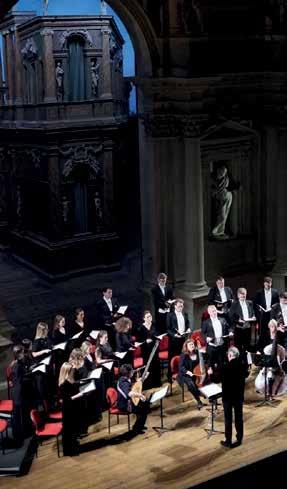
Kölner Philharmonie, Cologne
Monday 9 January 2023, 8.00pm
Scharoun Theater, Wolfsburg
Tuesday 10 January 2023, 7.30pm
Musikverein, Vienna
Wednesday 11 January 2023, 7.30pm
St Martin-in-the-Fields, London
Friday 13 January 2023, 7.30pm
Müpa, Budapest
Saturday 14 January 2023, 7.30pm
Isarphilharmonie, Munich
Monday 16 January 2023, 8.00pm
Sage Gateshead, Gateshead
Thursday 6 April 2023, 7.30pm
Chapelle Royale, Château de Versailles, Versailles
Saturday 8 April 2023, 7.00pm
Palau de la Música, Barcelona
Tuesday 11 April 2023, 8.00pm
Elbphilharmonie, Hamburg
Thursday 13 April 2023, 8.00pm
Bozar, Brussels
Saturday 15 April 2023, 8.00pm
Philharmonie Luxembourg, Luxembourg
Monday 17 April 2023, 8.00pm
Alte Oper, Frankfurt am Main
Tuesday 18 April 2023, 8.00pm
St Martin-in-the-Fields, London
Monday 24 April 2023, 7.30pm
Società del Quartetto di Vicenza/Colorfoto
John Eliot Gardiner is revered as one of the world’s most innovative and dynamic musicians and is a leader in the contemporary musical world. His work, as Founder and Artistic Director of the Monteverdi Choir, English Baroque Soloists (EBS) and Orchestre Révolutionnaire et Romantique (ORR) has made him a key figure both in the early music revival and historically informed performance practice.
Gardiner is a regular guest of the world’s leading symphony orchestras, including the London Symphony Orchestra, Symphonieorchester des Bayerischen Rundfunks, Royal Concertgebouw Orchestra and Gewandhausorchester Leipzig, conducting repertoire from the 16th to the 20th centuries.
His broad repertoire is illustrated by his extensive catalogue of award-winning recordings with the Monteverdi ensembles and other leading orchestras on major lables including Deutsche Grammophon and his own Soli Deo Gloria label. He holds two GRAMMY awards and has received more Gramophone Awards than any other living artist.
In 2022, John Eliot Gardiner has performed a number of successful tours with the Monteverdi Choir & Orchestras including partnerships with the Berlin Philharmonic, Concertgebouw, Luxembourg Philharmonie, Symphonies by Mozart and Haydn in Europe and the US, a programme of Bach, Schütz & Schein at prestigious festivals across Europe and Beethoven’s late masterpiece: Missa solemnis at the BBC Proms, Berliner Festspiele and Wratislavia Cantans.
In 2021 Gardiner conducted the Monteverdi Choir and English Baroque Soloists in a live streamed performance of Bach’s St John Passion from Oxford’s Sheldonian Theatre,
and performed at several of Europe’s most prestigious music festivals, including his 60th appearance at the BBC Proms. He ended the year conducting the Monteverdi Choir and ORR in performances of Berlioz’s sacred oratorio L’enfance du Christ, which included a critically acclaimed performance at the Monteverdi Choir & Orchestras new London home, St Martin-in-the-Fields.
The beginning of 2020 saw Gardiner conduct the ORR in three Beethoven symphony cycles as part of the Beethoven 250 anniversary celebrations. Other recent achievements with the Monteverdi ensembles include the RPS award winning Monteverdi 450 project in 2017, a reprise of the 2000’s famous Bach Cantata Pilgrimage, which toured to some of Europe’s most famous concert halls and churches in 2018. In 2019 Gardiner conducted new productions of Handel’s Semele and Berlioz’s Benvenuto Cellini, and gave his debut performances in Colombia, Russia, Brazil, Uruguay, Argentina and Chile.
An authority on the music of Johann Sebastian Bach, Gardiner’s book, Music in the Castle of Heaven: A Portrait of Johann Sebastian Bach, was published in October 2013 by Allen Lane, leading to the Prix des Muses award (Singer-Polignac). Among numerous awards in recognition of his work, Gardiner holds several honorary doctorates. He was awarded a knighthood for his services to music in the 1998 Queen’s Birthday Honours List.
© Liliya OlkhovayaEver since its founding in the 1960s, the Monteverdi Choir has been a leading force in the world of choral music. Through a combination of consummate technique, historically informed performance practice and a strong appreciation for visual impact, the Choir constantly strives to bring fresh perspectives, immediacy and drama to its performances across the world.
So far in 2022, the Monteverdi Choir has performed a number of successful tours, including works by Mendelsohn and Brahms in partnership with the Berlin Philharmonic, a programme of music by Bach, Schütz and Schein at prestigious festivals across Europe and most recently Beethoven’s late masterpiece: Missa solemnis at the BBC Proms, Berliner Festspiele and Wratislavia Cantans.
In 2021, the Choir performed its first live streamed concert; Bach’s St John Passion with the English Baroque Soloists, filmed in Oxford’s historic Sheldonian Theatre. The ensemble returned to live performing in the summer with a programme of Handel and Bach at the BBC Proms and Berliner Festspiele. The Choir ended the year with a tour of Berlioz’s sacred oratorio L’enfance du Christ, which included a performance at its new London home, St Martin-in-the-Fields.
The Monteverdi Choir accompanied the Orchestre Révolutionnaire et Romantique in performances of Beethoven’s 9th symphony in Barcelona, New York and Chicago in 2020, forming part of a wider project celebrating the 250th anniversary of the composer.
The Monteverdi Choir has taken part in a variety of projects across different repertoires, ranging from a tour of Bach’s St Matthew Passion (performed from memory) with the English Baroque Soloists (EBS) to Berlioz’s La damnation de Faust and Verdi’s Requiem with the Orchestre Révolutionnaire et Romantique (ORR). It has also performed in several staged opera productions, including Orphée et Eurydice at the Royal Opera House (2015), Der Freischütz (2010), Carmen (2009) at the Opéra Comique in Paris, and Les Troyens at the Théâtre du Châtelet (2003). In 2017 the Choir took part in the RPS award-winning Monteverdi 450 project, which saw them perform all three of Monteverdi’s surviving operas with Gardiner and the English Baroque Soloists across Europe and the United States. Amongst its many trailblazing tours was the Bach Cantata Pilgrimage in 2000, during which the Choir performed all 198 of Johann Sebastian Bach’s sacred cantatas in over 60 churches throughout Europe and North America. The entire project was recorded and released by the Monteverdi Choir & Orchestra’s record label, Soli Deo Gloria, with Gramophone hailing the venture as ‘one of the most ambitious musical projects of all time’. The Monteverdi Choir has over 150 recordings to its name and has won numerous prizes.
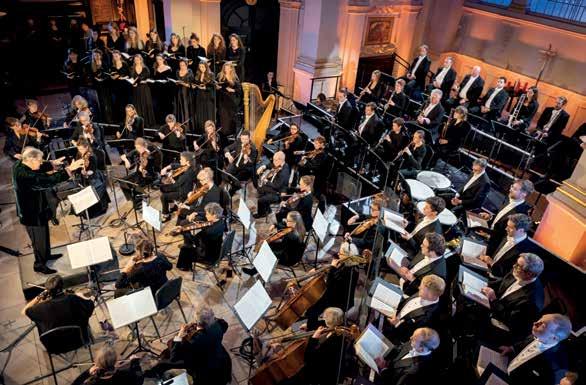

Founded in 1978 by John Eliot Gardiner, the English Baroque Soloists seeks to challenge preconceptions of 200 years of music ranging from Monteverdi to Mozart and Haydn. Equally at home in chamber, symphonic and operatic performances, their distinctively warm and incisive playing is instantly recognisable. One of the world’s leading period instrument orchestras, the ensemble has performed at many of the world’s most prestigious venues including the Milan’s Teatro alla Scala, the Concertgebouw in Amsterdam and the Sydney Opera House.
So far in 2022, the ensemble has completed a number of successful tours, including Symphonies by Haydn and Mozart across Europe and the United States and works by Bach, Schütz and Schein in collaboration with the Monteverdi Choir at prestigious festivals across Europe.
In 2021, the ensemble performed its first live streamed concert; Bach’s St John Passion, filmed in Oxford’s historic Sheldonian Theatre and streamed on Deutsche Grammophon’s online platform ‘DG Stage’. It also gave critically acclaimed performances of Handel and Bach at two of Europe’s most prestigious music festivals; the BBC Proms and the Berliner Festspiele.
In 2019 the EBS made its inaugural visit to South America for the Cartagena International Music Festival, and subsequently undertook a tour of Handel’s dramatic oratorio Semele with the Monteverdi Choir, visiting a series of iconic venues including Barcelona’s Palau de la Música and Milan’s Teatro alla Scala. The ensemble then gave its debut performances in Russia alongside the Monteverdi Choir with a programme of
works by Monteverdi, Carissimi, Scarlatti and Purcell, before returning to South America for further inaugural concerts in Brazil, Uruguay, Argentina and Chile.
2017 saw the EBS take part in the celebrated Monteverdi 450 tour, in which they performed all three of Monteverdi’s surviving operas across Europe and in the USA, a project that was recognised by a Royal Philharmonic Society award in the Opera and Music Theatre category.
The ensemble famously took part in the iconic Bach Cantata Pilgrimage in 2000 alongside the Monteverdi Choir, performing all of Bach’s sacred cantatas throughout Europe. The EBS has also participated in major opera productions alongside the Choir in works by Handel, Purcell and Monteverdi, and recorded Mozart’s greatest operas for Deutsche Grammophon in the 1990s.

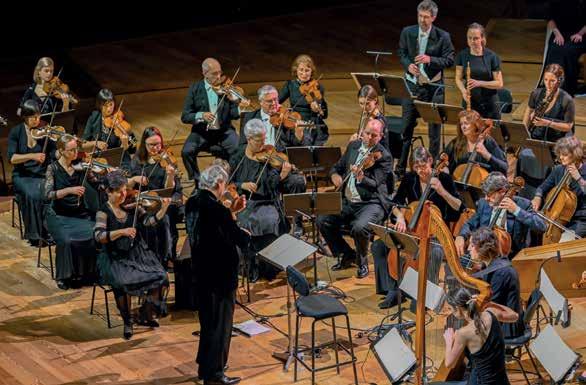
Kati Debretzeni
Iona Davies
Madeleine Easton
Jane Gordon
Beatrice Scaldini
Dominika Fehér
Anne Schumann
Davina Clarke
Henrietta Wayne
Jean Paterson Håkan Wikström
Fanny Paccoud
Alexandru-Mihai Bota
Lisa Cochrane Mari Giske
Kinga Gáborjáni
Catherine Rimer Ruth Alford
Valerie Botwright Cecelia Bruggemeyer
Rachel Beckett
Christine Garrett OBOE
Michael Niesemann Rachel Chaplin
Leo Duarte Robert de Bree
Györgi Farkas HORN
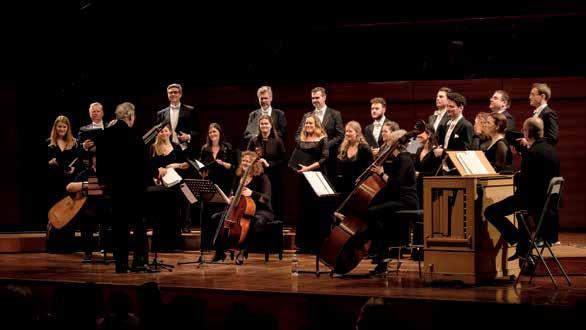
The three Monteverdi ensembles – the Monteverdi Choir, English Baroque Soloists and Orchestre Révolutionnaire et Romantique – are a leading force on the international music scene. World-class instrumentalists and singers of many different nationalities come together to share in the distinctive vision of our Founder and Artistic Director, John Eliot Gardiner, in ground-breaking projects that span eight centuries of musical masterpieces.
As a registered charity without public subsidy, Monteverdi Choir and Orchestras rely on the generosity of our supporters to continue planning our ambitious, historically-inspired artistic programme, and regularly perform world-class concerts at our new central London home, St Martin-in-theFields. This support also allows us to share our concerts with music lovers around the world through top-quality film and audio content, and helps us nurture and develop the next generation of musical talent. Here are the ways in which you can support us:
Monteverdi Choir and English Baroque Soloists at the Auditorium Agnelli – Torino, courtesy of Lingotto Musica © Mattia GaidoOur membership scheme starts from £250 per year. Members enjoy a range of benefits including a personalised priority booking service for all our concerts, monthly e-bulletins, and invitations to post-concert receptions. At higher levels, additional benefits include invitations to exclusive open rehearsals, backstage access after our performances, and an Annual Conductor’s Dinner.
By supporting our charity at this highest level, you will contribute substantially towards our landmark projects, allow us to perform regularly in our new London home at St Martin-in-the-Fields, and share our music globally via our filmed concerts.
We can offer creative and collaborative sponsorship packages that enable you to align your business with our work. There are opportunities to sponsor individual performances, or an entire season of concerts at our new London home, St Martin-in-the-Fields.
By choosing to leave a Legacy Gift to the Monteverdi Choir & Orchestras, you will play a crucial role in ensuring that the performers and listeners of the future will continue to be enthralled by the power of our music-making.
Our American Friends play a valuable part in supporting and championing the work of the Monteverdi ensembles both in the US and beyond. The American Friends of the Monteverdi Choir & Orchestras, Inc is a registered 501(c) (3) and donations to the AFMCO are tax deductible for US taxpayers.
On our website you will find the facility to make a donation (which we warmly welcome at any level), purchase one of our memberships for yourself, or treat a friend via a Gift Membership. If you would like to discuss how you could support us by becoming a Benefactor, or how your organisation could partner with us, please contact us to arrange a discussion with our General Director, Rosa Solinas.
development@monteverdi.org.uk +44 (0)20 7719 0120
Monday to Friday 10am to 6pm www.monteverdi.co.uk

The Monteverdi Choir & Orchestras gratefully acknowledges the generous support of the following individuals, organisations and Trusts & Foundations:
PATRON HM King Charles III
PRESIDENT Carol Grigor
PRINCIPAL FUNDER
Dunard Fund
Michael L. Cioffi – Monteverdi Tuscany, Castiglioncello del Trinoro, Italy Sebastiano Cossia Castiglioni Judith McCartin Scheide
Platinum David Best
Michael Beverley David & Sandra Brierwood Morny Davison
Lord & Lady Deben Lady Virginia Fraser Andrey Kidel
William Lock Francis Norton Helen Skinner
Sir David Walker
Gold
Lord Burns Gordon Gullan
Christian & Myrto Rochat Stephen & Victoria Swift
Silver Geoffrey Barnett Roger & Rosemary Chadder Peter & Stephanie Chapman Dr Carol Cobb Jake Donovan & Gracia Lafuente Sir Stephen Gomersall Yi-Peng Li Lady Nixon Professor Richard Portes cbe fba Anthony C. Shoults Captain Brian Woodford cbe rn
Bronze Tania Bader Mary Bernard Donald D. Campbell John Canady Peter J. Chapman Vanessa Claypole Anthony de Grey Steve Edge Alison & Mark Hesketh János & Dietlinde Hidasi Jenny Hill Richard Jacques Gareth & Charlotte Keene Mollie Norwich Nicholas & Christylle Phillips Mary Pinnell Daan Posthuma Thomas Richter Dr Paul A. Sackin Steven & Olivia Schaefer Christopher J. H. Thornhill Andrew Tusa Andrew Wales
Morgan Stanley
Dunard Fund
The Mrs FB Laurence Charitable Trust
The Prince of Wales’s Charitable Foundation
Donald Gorman
Ian Hay Davison cbe Christopher Stewart
Laura Youens
The Estate of Howard Hodgkin
The Estate of Kevin Lavery
We are grateful for the donations made in memory of our supporters. To find out more about supporting MCO via Legacy Giving, please visit www.monteverdi.co.uk/support-us/ leave-a-legacy
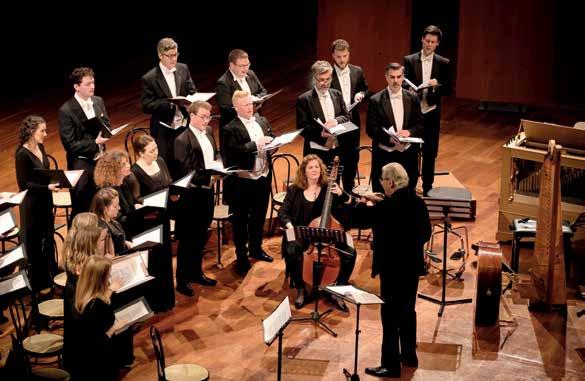
The Negaunee Foundation
The New York Community Trust –The Scheide Fund
Seth Levi
With grateful thanks to those who wish to remain anonymous
Monteverdi Choir and English Baroque Soloists at the Auditorium Agnelli – Torino, courtesy of Lingotto Musica © Mattia GaidoRosa Solinas
General Director & Chief Executive
Martin Wheeler Finance & Administration Manager
Matthew Broom Planning & Casting Manager
James Halliday Artistic Advisor & Librarian
Emily Parker Artistic Operations Manager
Margot Moseley Tours & Concerts Manager
Bryony Benstead Fundraising Manager
Andrew Softley Projects & Partnerships Manager (Choir Manager)
Hannah Bostock Marketing & Communications Coordinator
Dinis Sousa Associate Conductor
Philip Turbett Orchestra Fixer
Matthew Muller Stage Manager
Charlotte Marino Digital Operations Manager
Cover artwork: Epiphany by Darko Topalski
Sir David Walker (Chairman)
David Best
Lady Deben
Virginia Fraser
Sir Stephen Gomersall
Andrey Kidel
Francis Norton
THE MONTEVERDI CHOIR & ORCHESTRAS
Level 12, 20 Bank Street, Canary Wharf, London E14 4AD, UK
www.monteverdi.co.uk +44 (0)20 7719 0120 info@monteverdi.org.uk
Registered in England & Wales Company No. 01277513 Charity No. 272279
SIGN

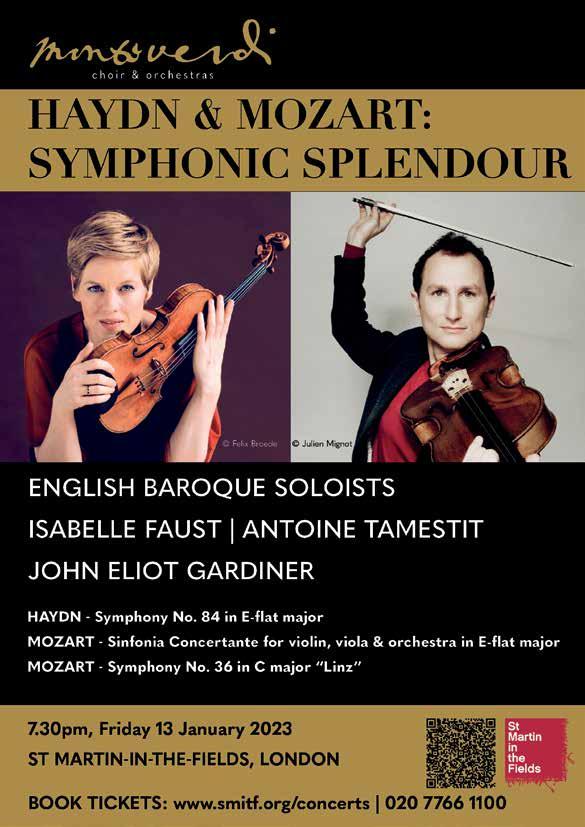



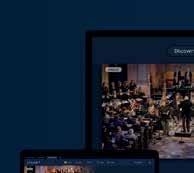

Livestreams from the world‘s most famous concert halls and opera houses New video and audio releases every week Extensive concert archive
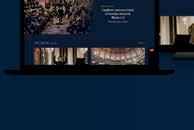
Over 1000 iconic classical albums Interviews, documentaries and music videos with the greatest classical artists Presented in 4k, Dolby Atmos and lossless audio
Relive the magic of tonight’s performance and watch J.S. Bach’s Christmas Oratorio performed by the Monteverdi Choir, English Baroque Soloists and John Eliot Gardiner on stage+ www.stage-plus.com

